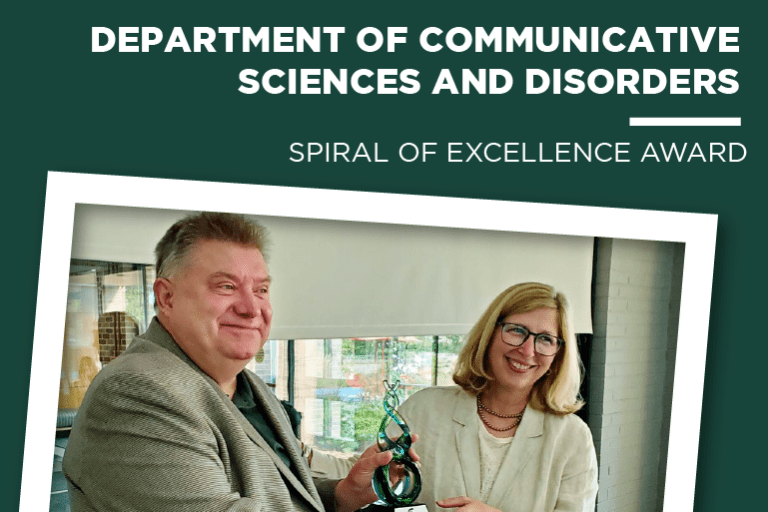The Department of Communicative Sciences and Disorders was awarded the inaugural Spiral of Excellence Award from Michigan State University Provost Teresa K. Woodruff on September 15, 2022. The award recognized the College of Communication Arts and Sciences department’s excellence in research and overall academics.
Dimitar Deliyski, MSU Foundation Professor and Chair of the Department of Communicative Sciences and Disorders (CSD), accepted the award on behalf of the department.
“The culture at CSD is such that every faculty member, staff member, and student work hard for advancing science, health care and academic training,” said Deliyski. “This award is an honor to receive, especially in its inaugural year, as it highlights that culture of excellence we’re striving toward.”
Since 2020, CSD added over $20 million in new research grants from the National Institutes of Health, published an average of four publications per faculty member, trained high-quality clinical and scholarly professionals, and demonstrated leadership in diversity, equity and inclusion — along with many other areas of service to MSU and the field of communicative sciences.
“I’m thrilled that leadership at MSU recognizes and rewards those who work hard to make a difference for the community, in line with MSU’s strategic plan,” said Deliyski. “I’m even more excited to lead a department filled with ethical colleagues who aspire to help people in need, and who spread positive thinking and success to others in the most selfless way.”
.png)
An overview of the Department of Communicative Sciences
CSD is made up of 12 faculty members, of which 10 are tenured-system, with the department's research focusing on communication development and rehabilitation, and the underlying basis of speech and language processes. Projects range from studying voice production, voice and speech disorders, to language in young children with autism.
“Every faculty member at CSD is involved either in executing a large funded research project, developing a new large proposal, or enhancing our four academic programs,” said Deliyski. “And a majority of those projects involve our students, both graduate and undergraduate.”
With a high job and research placement rate, the students in CSD have the opportunity to develop their professional skills in real-life settings, while having access to strong mentorship in some of the top communicative science research labs working on federally funded research projects. The undergraduate students receive solid background to meet the prerequisite requirements for successful application in graduate programs nationwide, while master’s students receive an exceptional combination of formative and clinical training through external placement in real clinical settings. The CSD Ph.D. students continue their postdoctoral training at some of the top research institutions and develop successful careers as faculty members in major research universities.
“We place a heavy emphasis on hands-on work and training for our students, which has set them up for major success after MSU,” said Deliyski. “For instance, three of our recent Ph.D. graduates received postdoctoral training at Harvard Medical School.”
“For the seven years I’ve spent as the chair of this department, I have dedicated my efforts to making every faculty, staff member, and student motivated and successful,” said Deliyski. “I’m proud of what CSD has accomplished, and look forward to continuing to push our research, community outreach and educational programs forward.”
Learn more about the department's:
By Samantha Brichta
